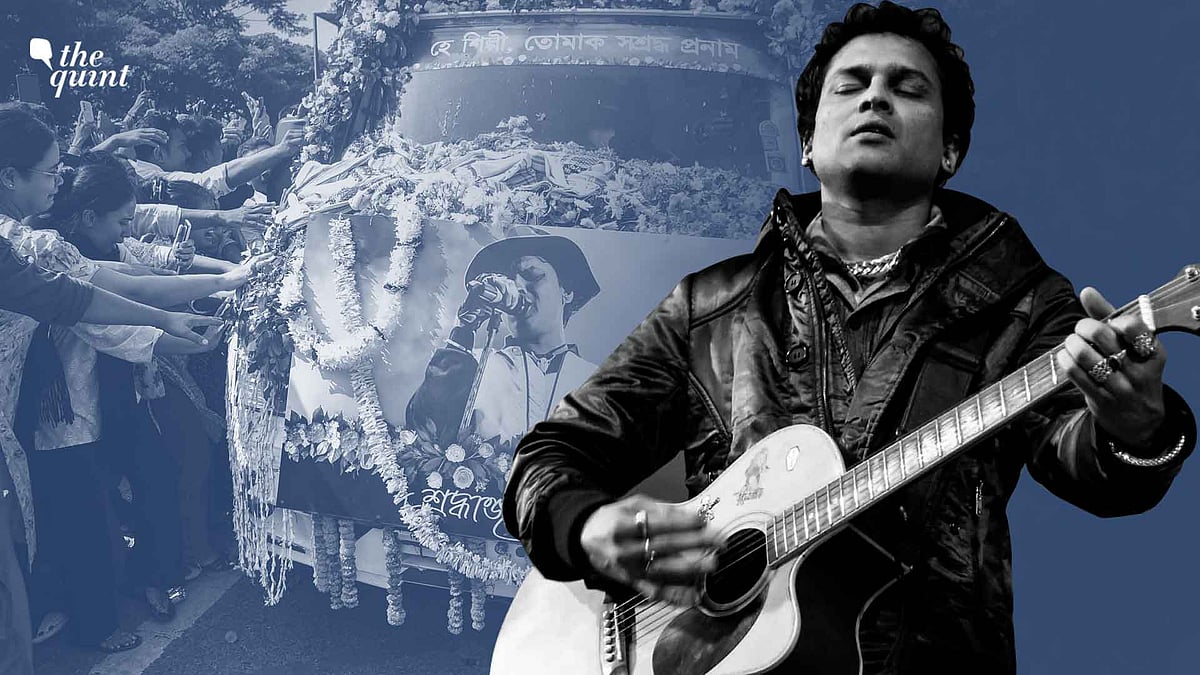
‘Joi Zubeen Da’: In Zubeen Garg’s Death, Assam Finds its Anthem of Grief
Assam mourns Zubeen Garg, the people’s artist whose voice united generations and brought a state to a standstill.

advertisement
"Zubeen Da aahi gol" (Zubeen Da is here)—shouts a passionate fan as the ambulance carrying the lifeless body of the legend crosses a street of Guwahati. Almost immediately, thousands run to catch a glimpse of Assam’s favourite son.
One must be in Assam to understand, or even begin to comprehend, the cultural phenomenon that the state is currently gripped in. It is something we surely will not see again in our lifetime. Nor will we ever have someone like Zubeen Garg, who was the pulse of an entire ethnic group.
After Zubeen's unfortunate death on 19 September, the entire state is at a standstill. Millions are on the streets. Shutters are down. And every few metres you see sakis (lamps) and candles lit in front of Zubeen’s photograph.
Zubeen was perhaps the only one who could bring the state to a halt with a single gesture. And with his untimely demise, he did exactly that.
(Photo: PTI)
The Irony of a Centenary Year
This year, Assam was preparing to celebrate the centenary of legendary singer Bhupen Hazarika’s birth, a year-long celebration of music, art, and culture. But the irony is that in the 100th year of Hazarika’s legacy, Assam has lost another of its biggest and most influential cultural icon.
Zubeen, however, was an exception. In recent years, he had become the cultural icon ruling over the younger side of society. His voice, through which he sang around 40,000 songs, could bring order to chaos.
He was perhaps the only one who could bring the state to a halt with a single gesture. And with his untimely demise, he did exactly that. His aura and influence were such that lamps were lit not just in homes, markets, temples, and naam ghars, but also in mosques and churches. That was Zubeen Garg.
A State in Mourning
Since the news of his death broke, people have flooded the streets, howling in grief and chanting ‘Joi Zubeen Da!’ (Hail Zubeen Da!), a slogan that became popular long before his passing. It is nothing short of surreal to see and hear millions singing ‘Mayabini,’ one of his chartbusters, which he had once said should be sung after his death. And so, the people sang. Even Chief Minister Himanta Biswa Sharma joined in at the Delhi airport, while receiving his body.
On the streets of Guwahati, tributes poured in from every section of society. Hundreds of e-rickshaws lined up to play his songs and rallied around the city. Bus drivers held condolence meetings. Shopkeepers expressed their grief in their own way. Communities—religious, ethnic and economic—paid tribute in their own styles.
One must be in Assam to understand, or even begin to comprehend, the cultural phenomenon that the state is currently gripped with.
(Photo: PTI)
He was intersectional in many ways. Our fathers and grandfathers had Bhupen Hazarika, Jayanta Hazarika, and other icons. Many of us born in the 1990s never had the chance to experience them live.
But Zubeen reached across generations. The 90s kids grew up immersed in his fandom, the millennials carried it to its peak, and Gen Z also got a taste of his influence. His career spanned the cassette era, the CD era, and the streaming era.
The Man of Many Songs
Almost everyone in Assam has a Zubeen story. He was the kind of man you could see eating puris at a roadside stall, borrowing tobacco from a security guard, sitting on the street and jamming with locals, or donating generously without hesitation. He had a song for every occasion, from joy to sorrow, from love to heartbreak, from devotion to parties, from folk to pop. Zubeen was like water, able to take any shape.
He was an idol to every singer in the state, a reviver of Assamese cinema, a social activist, a sports lover, and so much more. Paragraphs of text cannot capture the emotion that Zubeen was, or rather, still is.
Zubeen reached across generations.
(Photo: PTI)
He feared no one and lived like a king. He was always vocal about the state’s issues and became the biggest voice of the people without any political affiliation. He could criticise both, the ruling government and the opposition, and no one dared retaliate.
In these unstable times, Zubeen’s was perhaps the only voice that could bring instant peace. He sang during insurgency, when death was a daily reality. He sang during citizen protests, when voices needed amplification. He dared to sing it all, uncensored. He was a true activist of the people.
And what did he earn from all this? The love you see on the streets today. He unified the state in mourning, brought political leaders to stand in line to pay their respects, and moved millions to sing ‘Mayabini’ in one voice.
His contributions to music, art, and film deserve their own dossier. He established himself not just as Assam’s but the entire Northeast’s biggest cultural icon. This is a teary-eyed farewell to the phenomenon called Zubeen Garg. No words can truly quantify what he meant, what he was and what he will always be to the people of Assam.
(The author is a communications consultant from Assam. This is an opinion piece. The Quint neither endorses nor is responsible for the same.)
- Access to all paywalled content on site
- Ad-free experience across The Quint
- Early previews of our Special Projects
Published: undefined